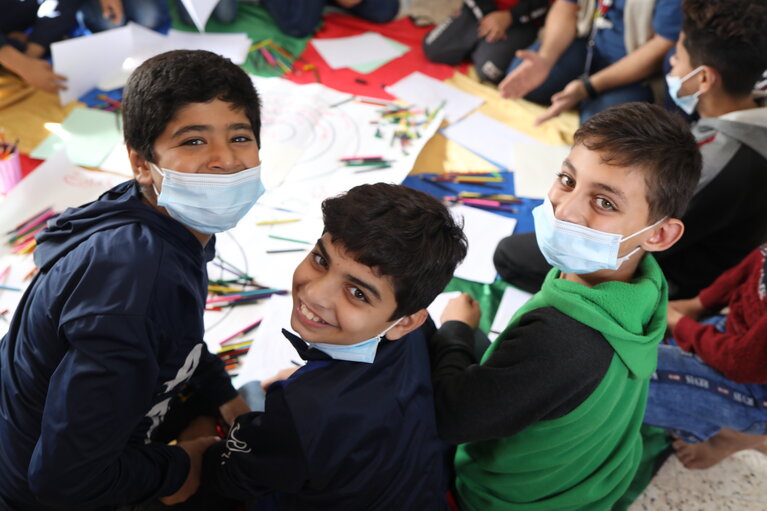Helping a first grader overcome war nightmares
An occupied Palestinian territory Humanitarian Fund Success story
Salah’s nightmares have finally stopped. In May 2021, at the age of six, he survived a massive blast caused by a bomb that landed very close to his house. He lives in the Gaza Strip, which at the time, was the epicentre of an 11-day-long escalation of hostilities between Israeli forces and armed Palestinian groups. Those endless days and nights of heavy bombardment took a psychological toll on all people across the blockaded enclave, but particularly on children.
Following the incident, Salah felt more and more insecure. He became attached to his parents and refused to go to the bathroom alone. He needed company in his bedroom too, where he had recurring nightmares about the war.
At school, staying focused became a major challenge. Salah’s parents noticed that he re-enacted the traumatic event when playing with his peers. Hearing news about the possibility of a new escalation of hostilities, a common reality in Gaza, would make him anxious and agitated. His parents and teachers noticed how irritable and aggressive Salah had become.
Realizing that her son needed professional support, Salah’s mother called a counselling hotline operated by the Gaza Community Mental Health Programme (GCMHP), a partner of UNICEF, supported by the occupied Palestinian territory Humanitarian Fund (OPT HF).
Following a referral from the hotline counsellor, Salah’s father took him to a GCMHP-run community centre in Khan Younis, their town, where he was assessed by a multidisciplinary team and diagnosed him with post-traumatic stress disorder (PTSD). The centre’s team put a therapeutic plan in place that included psychotherapy, play therapy, and family counselling.
Through the Humanitarian Fund, UNICEF supported two partners to provide protection and mental health support services through their hotlines. At least 1,104 children (39 per cent girls) and 1,774 adults (42 per cent women) accessed MHPSS services remotely providing callers with the opportunity to debrief to a professional and helping them to understand the situation and source out support through available networks. Callers who need more specialized mental health support services were further referred to access needed support.
The nightmares stopped occurring,” his father said with satisfaction. “He now goes to the bathroom without asking us to accompany him. He even finishes all of his homework, unlike before.” While feeling more secure, Salah has not yet fully recovered, and continues the treatment at the GCMHP centre.











